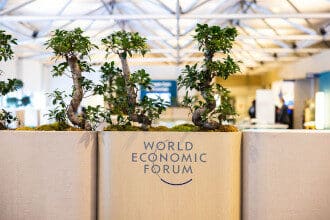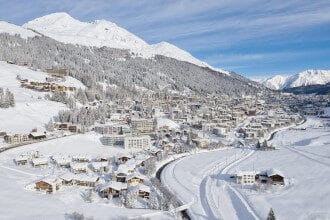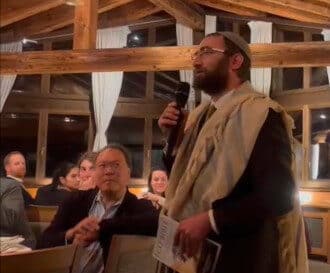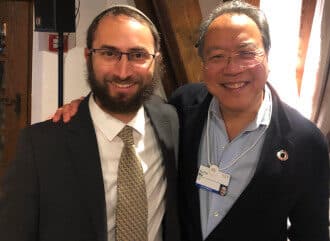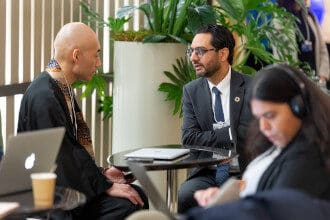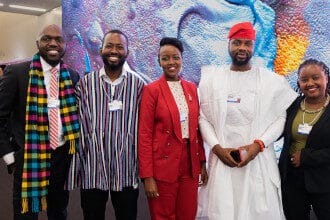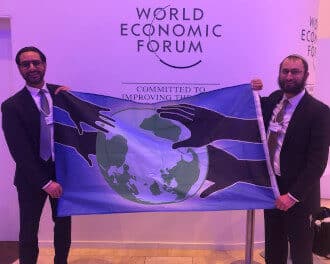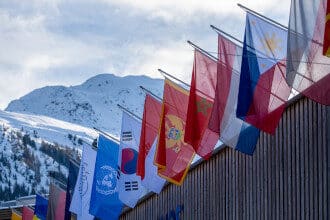The Interfaith Center for Sustainable Development has engaged in multiple World Economic Forum (WEF) events through the participation of its executive director, Rabbi Yonatan Neril. He attended the WEF Annual Meeting in Davos, Switzerland, in January 2023, and the WEF Regional Forum in Jordan in 2019.
Here are some ICSD highlights from the 2023 WEF Annual Meeting:
The meeting opened with a moving musical performance focused on saving the coral reefs of the Red Sea. Musicians and speakers from Saudi Arabia, Jordan, Israel, and many countries performed and spoke in the “I Sea You” event. Nouf Alosaimi, a Saudi female scuba diving enthusiast and head of Red Sea Citizen, opened the performance, which was conceived by the Israeli singer Noa Barak.
Rabbi Neril was one of the speakers at “The Custodians of the Earth” dinner in Davos, which represented an effort by the WEF to put indigenous and religious voices front and center.
This session included presentations on how indigenous and faith communities are an important part of ecological solutions. The session followed the release of a new WEF report, “Embedding Indigenous Knowledge in the Conservation and Restoration of Landscapes.”
At “The Custodians of the Earth” dinner, cellist Yo-Yo Ma performed as Helena Gualinga told a story. Gualinga is an Ecuadorian environmental and human rights activist from the Kichwa Sarayuku community in Pastaza, Ecuador.
She has become a spokesperson for the Sarayuku indigenous community, raising awareness by exposing the conflict between oil companies and her community, through her work in local schools as well as with the international community.
There were also participants from the religion and ecology movement whose ongoing work engages with people in philanthropy, business, and government.
Rabbi Neril also spoke at an interfaith Vigil for Justice and Peace at the conference, organized by Karen Tse, founder and director of International Bridges to Justice (IBJ). The event, held just outside the WEF, included speakers from many faith traditions.
Over 50 heads of state and government attended the full Annual Meeting, as well as more than 1,500 leaders from the private sector, 500 media leaders, and hundreds of representatives from NGOs, academia, labor organizations, Indigenous communities, and religious institutions.
Of the 263 sessions that took place, dozens focused on ecological sustainability, and were hosted by the WEF’s Center for Nature and Climate and the WEF’s Global Plastic Action Partnership, which focused on an emerging global plastics treaty.
The WEF was founded in 1971 by Klaus Schwab, and has been a place where political leaders have met and occasionally promoted peace initiatives, including between Greeks and Turks in 1988, between white and black South Africans in 1992, and between Israelis and Palestinians in 1994. The annual conference has been going on for 52 years.
Davos is located in the Swiss Alps, two hours east of Zurich near the border with Austria. Davos itself is experiencing the impact of human-caused climate change. Temperatures in the Alps are rising around twice as fast as the global average.
If greenhouse gas emissions continue to rise, the Alps glaciers are expected to lose more than 80% of their current mass by 2100. Such a glacial retreat will have a major impact on Switzerland and Europe.
While some participants arrived via private jets, helicopters, or limousines, many participants (including Rabbi Neril) took trains from Zurich to Davos. The trains are powered by renewable hydroelectric energy, which makes this a unique zero carbon emissions transportation option.
